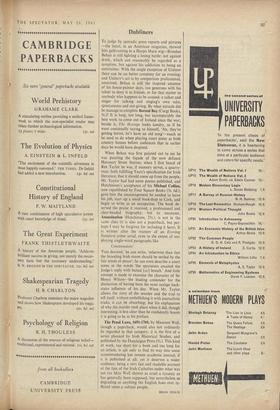To judge by sporadic press reports and pictures —the latest,
in an American magazine, showed him gallivanting in a Harpo Marx wig—Brendan Behan is still fighting a losing battle: not against drink, which can reasonably be regarded as a symptom, but against his addiction to being an entertainer. With the single exception of Ustinov there can be no better company for an evening; and Ustinov's art is by comparison professional, contrived. Behan is still the inspired amateur of his house-painter days, too generous with his talent to deny it to friends, or for that matter to anybody who happens to be around: a talker and singer for talking and singing's own sake, spontaneous and out-giving. By what miracle did he manage to complete Borstal Boy (Corgi Books, 5s.)7 It is long, too long, but incomparably the best work to come out of Ireland since the war; beside it, The Hostage looks tawdry, as if he were continually saying to himself, 'Ah, they're getting bored, let's have an old song'—much as he used to do when playing court jester at Irish country houses before audiences that in earlier days he would have despised.
When Behan was first pointed out to me he was painting the façade of the now defunct Harcourt Street Station; when I first heard of Rex Taylor he was, if memory serves, a quarry- man; both fulfilling Yeats's specification for Irish literature, that it should come up from the people. Mr. Taylor had had some poems published, and Hutchinson's acceptance of his Michael Collins, now republished by Four Square Books (3s. 6d.), gave him the encouragement he needed to leave his job, start up a small bookshop in Cork, and begin to write as an occupation. The book de- served the praise it received, a professional and clear-headed biography; but its successor, Assassination (Hutchinson, 25s.), is not in the same class (it is also not a paperback, but per- haps I may be forgiven for including it here). It is written after the manner of an Evening Standard crime serial, even to the extent of em- ploying single-word paragraphs like Consternation!
'Fate decreed,' he can write, 'otherwise than that the brooding Irish storm should be settled by the fair winds of peace'; he can even describe a court scene in the words 'the spectators awaited the Judge's reply with baited [sic) breath.' And little attempt is made to examine the character of Sir Henry Wilson—the leading contender for the distinction of having been the most malign back- stairs influence of his day. When Mr. Taylor allows the story of the murder and the trial to tell itself, without embellishing it with journalistic tricks, it can be absorbing; but his explanation of why the murder took place when it did, though interesting, is less clear than he confidently boasts it is going to be in his preface.
The Penal Laws, 1691-1760, by Maureen Wall, though a paperback, would also not ordinarily be regarded in that category; it is the first of a series planned by Irish Historical Studies, and published by the Dundalgan Press (5s.). This kind of work, too short for a book and too long for an article, is apt only to find its way into some accommodating but remote academic journal, if it is published• at all; yet it deserves a wider audience, being a very fair and readable account of the fate of the Irish Catholics under what was not (as Miss Wall shows) as cruel a tyranny as has generally been supposed, but nevertheless as degrading as anything the English have ever in- flicted upon a subject people.
BRIAN INGLIS














































 Previous page
Previous page